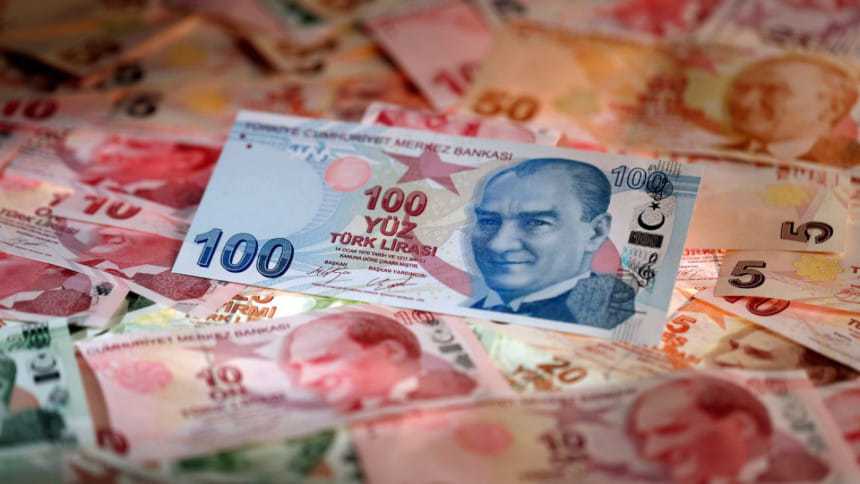Turkey tries to calm markets as lira hit again

Turkey's central bank announced Monday a raft of measures aimed at calming markets rattled by the precipitous plunge of the Turkish lira but the currency again plunged on the back of defiant comments by President Recep Tayyip Erdogan.
A dispute between Nato allies Turkey and the United States -- which reached new intensity over the detention of an American pastor -- has hammered the lira and also raised questions over the future partnership between Washington and Ankara.
It caused global market jitters last week as investors fretted over potential economic contagion from Turkey, particularly to European banks.
The already embattled Turkish lira tumbled some 16 percent against the dollar on Friday as US President Donald Trump said he had doubled tariffs on steel and aluminium from Turkey.
In European trade on Monday, the lira was trading at 6.88 to the dollar, a loss of another 7.0 percent on the day but recovering from even sharper losses in earlier Asian trade where it struck a record low of 7.2362 to the dollar.
In its first statement since what was dubbed "Black Friday" in Turkey, the central bank said it was ready to take "all necessary measures" to ensure financial stability, promising to provide banks with "all the liquidity" they need.
The bank also revised reserve requirement ratios for banks, in a move also aimed at staving off any liquidity issues.
But to the dismay of markets, the statement gave no clear promise of rate hikes, which is what most economists and analysts say is needed to ease the crisis.
Turkey's Finance Minister Berat Albayrak late Sunday said Ankara was planning to roll out an "action plan" on Monday to "relieve the markets."
Albayrak's comments came as Erdogan, who is his father-in-law, said he was in no mood to offer concessions to the United States in one of the worst spats between the two Nato allies in years.
"We are once again facing a political, underhand plot. With God's permission we will overcome this," said in a speech Sunday.
Erdogan has been sanguine over the punitive measures announced by the US, saying that while Turkey's relationship with Washington is at stake it will look for other partners.
Analysts say that while Washington's sanctions against Ankara sparked the immediate crisis, Turkey's economy has been risking trouble for a while due to high inflation and the weak lira.
The central bank has over the last few weeks defied calls from markets for rate hikes to combat these problems, raising fears of interference from Erdogan who has repeatedly called for low interest rates.
Erdogan had on Saturday described interest rates as a "tool of exploitation", in remarks unlikely to impress the markets.
"Investors need to see serious economic measures and not political ones to prevent things getting completely out of control," said Hussein Sayed, chief market strategist at FXTM, saying this had to include an emergency rate hike.
The Interior Ministry launched an investigation into 346 social media accounts on grounds of "provocative sharings on social media", the state-run Anadolu news agency reported.
The Istanbul prosecutor's office also said it would probe actions that threatened "economic security" while Turkey's financial watchdog MASAK launched a separate scrutiny into "fake news" aimed at manipulating the economy, Anadolu said.
Erdogan's spokesman Ibrahim Kalin also warned against "speculative news or actions", saying that Turkey's financial institutions were taking "necessary steps to keep financial stability."
American pastor Andrew Brunson has been held since October 2016 on terror and espionage charges and, if convicted, could face a jail term of 35 years. Trump has described his detention as a "total disgrace" and urged Erdogan to free him immediately.
A delegation led by Turkish Deputy Foreign Minister Sedat Onal failed to secure a deal last Wednesday in talks in Washington on a number of issues including Brunson.
Erdogan confirmed media reports that Washington gave Onal's delegation a deadline of 6:00 pm last Wednesday for the release of Brunson "otherwise the sanctions will begin".
“President Erdogan of Turkey is showing no sign of backing down against the US," said market analyst David Madden at CMC Markets UK, adding the crisis risked having a "knock-on effect" around Europe.
Foreign Minister Mevlut Cavusoglu said it was not possible to understand or accept the sanctions and threats. "We expect the US to stand by our traditional friendly relations and our relationship as allies at the Nato," he told a gathering in Ankara.

 For all latest news, follow The Daily Star's Google News channel.
For all latest news, follow The Daily Star's Google News channel. 



Comments